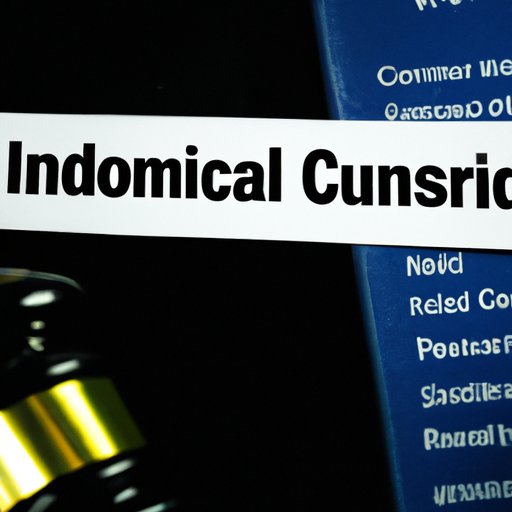Introduction
If you’re unfamiliar with the legal system, terms like indictment, arraignment, and conviction can be confusing. In this article, we’ll break down everything you need to know about indictment: what it is, how it works, and what it means for someone who has been accused of a crime.
Breaking Down the Indictment Process: What You Need to Know
Indictment is the formal accusation of a crime by a grand jury. It’s an important step in the criminal justice system because it means that the case will move forward to trial.
A grand jury is made up of citizens who have been chosen to determine if there’s enough evidence to take a criminal case to trial. Grand juries have the power to subpoena witnesses and documents, and they listen to testimony from the prosecutor and other witnesses.
Most serious crimes, such as murder, rape, and white-collar crimes like fraud and embezzlement, require an indictment.
From Accusation to Trial: The Ins and Outs of Indictment
After someone is indicted, there are several stages in the criminal justice system that take place before the trial. The person accused of the crime (the defendant) will be arraigned, which means they’ll appear in court and the charges against them will be read aloud. At this point, the defendant will enter a plea of guilty or not guilty.
If the defendant pleads guilty, they’ll move on to sentencing. If they plead not guilty, they’ll move on to trial.
Indictment is an important step in the process because it ensures that the prosecution has presented enough evidence to move forward with a trial.
Indictment 101: A Beginner’s Guide to Criminal Proceedings
Indictment is based on the concept of “probable cause.” This is the idea that there’s enough evidence to believe that a crime has been committed and that the accused person is responsible for it.
After an arrest, the defendant will be taken into custody and booked. They have the right to an attorney, and they’ll be questioned by the police. If the prosecutor believes there’s enough evidence to support an indictment, they’ll present their case to a grand jury.
If the grand jury determines that there’s enough evidence to move forward, they’ll issue an indictment. At this point, the defendant is formally accused of the crime they’ve been arrested for.
The next steps in the process include pretrial motions, plea bargaining, and the trial itself. Depending on the outcome of the trial, the defendant may be found guilty or not guilty.
Unpacking the Legal Jargon: Understanding Indictments
Some of the legal terminology that’s central to the indictment process can be confusing. For example, an “information” is similar to an indictment, but it’s presented by a prosecutor instead of a grand jury.
The “charges” in an indictment refer to the specific crimes that the defendant is accused of committing.
There are also different types of indictments, such as sealed indictments (which are kept secret until the defendant can be arrested) and superseding indictments (which add new charges or replace previous charges).
Indictment: How It Differs from an Arrest Warrant and What It Means for You
Indictment and arrest warrants are both ways of formally accusing someone of a crime, but they’re different in several key ways. An arrest warrant is issued by a judge when the police believe that someone has committed a crime, while an indictment is issued by a grand jury after evidence has been presented.
Being indicted can have serious consequences. It means that the legal process has officially begun, and a trial will likely take place. An indictment will also appear on a criminal record if the defendant is convicted.
Behind the Scenes of an Indictment: What Happens Before a Trial
Before the trial, there are several things that happen behind the scenes. For example, prosecutors and defense attorneys may engage in plea bargaining, where they negotiate a plea deal that allows the defendant to plead guilty to a lesser charge in exchange for a lighter sentence.
There are also pretrial motions, where either side can ask the judge to make a ruling on a specific aspect of the case before the trial begins.
Prosecutors and defense attorneys will spend time preparing for the trial, reviewing evidence, and lining up witnesses.
Conclusion
Indictment is an important part of the criminal justice system. It’s the formal accusation of a crime by a grand jury, and it means that a case will likely proceed to trial. Understanding the indictment process can be helpful for anyone who has been accused of a crime or is simply interested in how the legal system works.
Knowing the stages of criminal proceedings and the legal terminology used is crucial for anyone involved in the justice system, whether as an accused, lawyer or a judge. Regardless of the position one holds, learning about indictment and how it fits into the bigger picture will help to ensure that everyone is on the same page.
